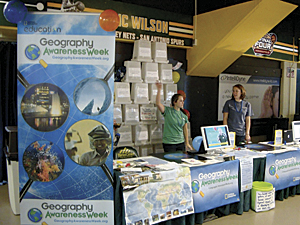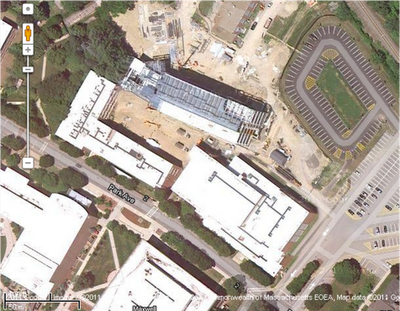Note from Dr. Hayes-Boh: Many of our majors end up working in environmental professions, and we teach several courses specifically intended to prepare our students for such careers. Each student should take responsibility, however, to cultivate interests and develop skills that will build both competence and credentials. Membership in organizations such as NAEP or MACC can be part of such preparation, as can carefully-selected courses in mathematics, foreign languages, and other sciences.
The webinar described below is one example of the learning opportunities available.
NAEP JANUARY 2012 WEBINAR ANNOUNCEMENT
Native American Consultation for Environmental Professionals
TO REGISTER FOR THE WEDNESDAY, JANUARY 25 WEBINAR PLEASE CLICK THE APPROPRIATE LINK BELOW
Native American or Tribal consultation is a key element of many types of projects that an environmental professional might encounter. Federal, state, and private project can all benefit from effective consultation. Implementing Native American consultation early in the process can identify potential stumbling blocks (or worse) and facilitate a smoother planning process moving forward.
The NAEP Education Research & Science Working Group is organizing an informative webinar to provide background information about the benefits and application of Native American consultation in the planning process, including why it is advisable and how to avoid pitfalls in the consultation process. NAEP’s goal is to provide members and other environmental professionals in the nation with a good understanding of what is and what is not consultation, as well as how to initiate consultation to the benefit off the full project planning team and public.
Thomas F. King, Ph.D. will lead an informative webinar discussing Native American consultation. Dr. King will discuss why consultation is advisable with reference both to legal requirements and the practicalities of impact assessment and planning. He will also outline some of the main issues that often trigger Native American or Tribal consultation, the etiquette surrounding consultation and what is and is not often considered correct consultation from the Native American perspective. Dr. King will also highlight the common causes of project delays and difficulties associated with Native American consultation. In addition to Dr. King, this webinar will include perspectives from a Tribal representative when discussing consultation concerns.
Dr. King has spent 45 years working in cultural resource management, historic preservation, and environmental impact assessment. He is the author of eight textbooks and one tradebook (as of 2010) on cultural resource management through Left Coast Press and Altamira Press, and editor of Wiley-Blackwell's "Companion to Cultural Resource Management" (2011). Dr. King currently provides consultation assistance to the Department of Veterans Affairs, the Bureau of Reclamation, the Fort Mojave Indian Tribe, and other clients. Dr. King has also been an active member of the NAEP NEPA Working Group.
Date and Time: Wednesday, January 25, 2012 at 1pm ET (12pm CT, 11am MT, 10am PT)
Duration: Event will last 90 minute
Location: Wherever it is convenient for you
Location: Wherever it is convenient for you
Questions: Please contact Tim Bower at 856-283-7816 or email him at naep@naep.org
Registration Fees:
* NAEP members — $79.00
* NAEP Affiliate Chapter members that are not NAEP members — $98.00
* Non-members (NAEP or Affiliated Chapters) - $109.00 (Save $30—please consider joining to receive the member rate for this and future events)
* Full time Students can participate at a reduced fee of $39.00
* NAEP members — $79.00
* NAEP Affiliate Chapter members that are not NAEP members — $98.00
* Non-members (NAEP or Affiliated Chapters) - $109.00 (Save $30—please consider joining to receive the member rate for this and future events)
* Full time Students can participate at a reduced fee of $39.00













































